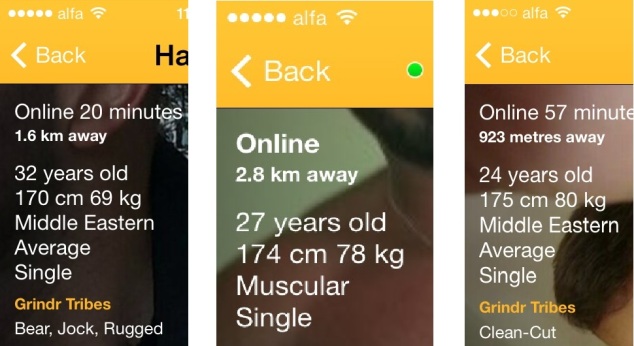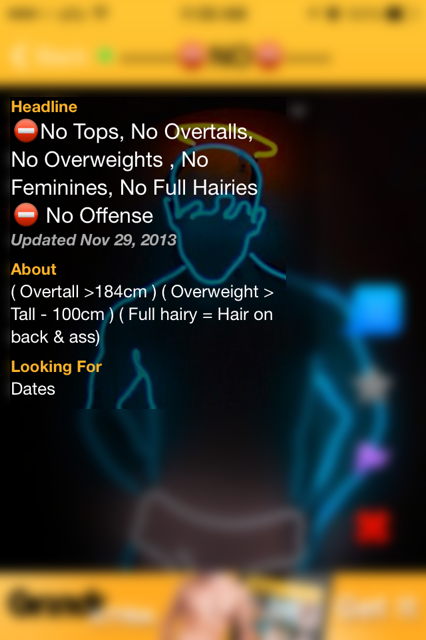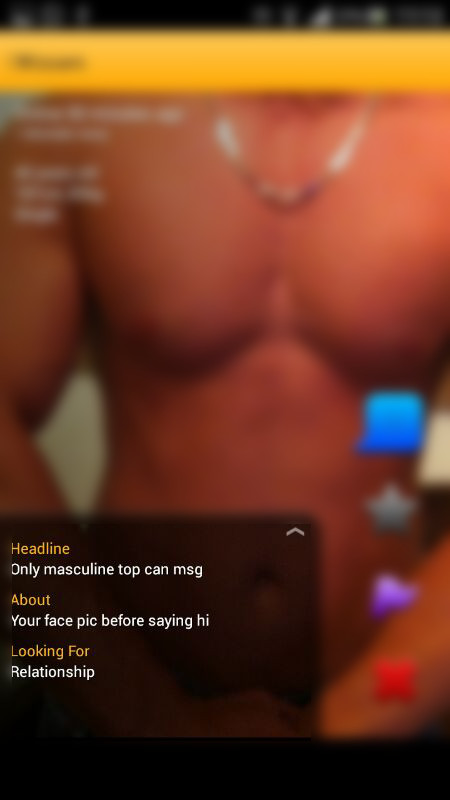“Gay men have forgotten how to have sex (…) For so long that was supposed to be something gay men were good at, but I’m not so sure anymore. They might be good at the technique but not the openness. Sex should be about opening possibilities, not closing them off.”
Why Are Faggots So Afraid of Faggots? by Mattilda Bernstein Sycamore
Imagine Grindr as bowl of fruits and each person is a different looking fruit; some of these fruit look appealing and other not as much. Now imagine that you remembered that you are still wearing your colored eye glasses and you take it off. All of the sudden, the fruits in the bowl look completely different. They are still not the same as each other but they all look as appealing and those couple of exotic fruits stopped being as more tempting as they used to. What I would like to look at through this post is how gay dating apps like Grindr, Scruff and Growlr in themselves, the way people use them and present themselves through them end up perpetuating forms of oppression and racism et al. (homophobia, transphobia, misogyny etc…).
We believe that our desires are real and natural since we usually experience them as strong, passive impulses from within and are usually unique to us. I argue that this sense of innate preference is in fact an artifact of social desirability and popular aesthetics; we are attracted to bodies that exhibit attributes that are considered positive and beautiful. In doing so, we create bodies that are not desirable. Moreover, I will try to show how we marginalize and “otherize” these non-desired bodies in patterns that are based on and also re-enact forms of discrimination and “sexual segregation”. By the end of this post, I would hope that you become convinced of the need to challenge constructed concepts of beauty by opening up to greater possibilities of encounters with bodies and persons that we would usually dismiss as non-desired.
Grindr has become a large cultural phenomenon within the gay community that offers an experience that may be both liberating and oppressing. (±)
These dating apps have been incorporated into the majority of queer spaces in Lebanon and many people are joining them every day. Although they are mainly regarded as “hook up” services, many people are discovering new and innovative ways to use them. Some people are making use of the anonymity of the cyber space to reach out and find a friend or a confidante whom they would otherwise find it difficult to connect to. Over the past summer, I have met one of my best friends over Grindr, met someone who showed me how to prepare a mojito drink and helped a tourist lost in Hamra find his way around among many other wonderful encounters.
But these apps also hold within them the possibilities and potential to be oppressive and marginalizing.
By exotifying flesh we otherize people (±)
Exotification of the body could work both ways. By praising certain bodies, we create their alternative reverse. If the masculine figure is held in high regards, it is kept there at the expense of devaluing the feminine one. If the able-bodied (including the athletic, the sportive…) raises interest and curiosity then the disabled one raises doubts about inconvenience. If the fit body is considered healthy then the “fat” body is considered lazy and sick.

In using these apps people are expected to disclose their sexuality and gender, but are also expected to disclose their body types (±).
People would not and do not fall on these exact binaries; fit vs. fat, able vs. disabled, masculine vs. feminine, but rather fall somewhere on the spectrum along these two end points. What we need to understand though is by praising and valuing certain body types, we do so by “othering” body types that do not fit that profile. Each construct that we create holds within itself its own reversal; its own nemesis.
A lot of hate when all we want is head (†)
If you have ever used these apps then you surely have noticed the amount of hate and oppressive speech on some people’s introductory profiles.
“Manly for active manly men”, “real men”, “fit or muscled”, “only masculine”, “gayish eyeglasses”, “huge muscled beefy manly guys”, “fat”, “chubby”, “no syrian”, “no Asians”, , “khalik 3ala ramlit el bayda”, “feminine”, “dwarfs”, “tall”, “bitzabit 7wejbak”, “psychos”, “no overtall”, “no overweight”, “no full hairies”…”no offence”; All of these are a sample of headlines collected from a selection of profiles available within my radius through the months of November 2013 – January 2014.
As a person who lived through the age of Manjam and web-based dating sites in Beirut, I am troubled by the amount and ease by which users feel comfortable and to some extent confident about declaring such oppressive and racist (et al.) declarations to express their modes of desire for other users and which is “somehow made allowable as a language of sexual attraction or personal preference (§).”
Although one’s intent might not be racist et al. (and many people do point that out by adding a “no offence” remark after a line or two of bigoted epithets), we can not disregard that the negative language that is being used to indicate preference, desire and fantasy is in itself bigoted and othering.
Grindr, Scruff, Growlr and other similar apps present a very interesting trend in gay dating services. Even though they operate through the non corporal cyber space yet they are grounded with physical location through the use of the GPS. In that sense, it allows queer bodies to gather and congregate without the usual geographic and social barriers where the placement and accessibility of queer spaces are governed by the usual suspects of history, race and class just like everything else (§).
(De)Constructed Desire
Although it would be hard to differentiate between the innate and socially constructed expressions of desire and preference, we can safely acknowledge that the majority of this desire and its expressions are built through popular forms of beauty and aesthetics. Literature supporting the claim of innate preference are scarce and inconclusive while a huge bulk of it support the later claim.
What we can also acknowledge is that by specifying our desires into set blocks of what is appealing and what is not, we limit ourselves into pre-defined constructs. This simplifies our potential experiences and moves us from a culture of sexual liberation to one of “sexual segregation” (†).
By advocating desire as natural factor versus an artifact one, we perpetuate forms of oppression that are based on racist and discriminatory rhetoric.
Moving Forward
For starts, we can begin by moving from negative exclusionary descriptions to positive ones. Instead of specifying what we are not interested in (or more specifically what we do not want to experience/experiment) to what we require and/or like. We still have to acknowledge that we are not changing the message and the content but only the wording (†). This can only address the principle of exclusion and othering that users experience while shuffling through the profiles while failing to address the oppressive nature of such descriptions.
A better approach is to embrace the diversity and flexibility of our desires and shift the focus from sexual attraction to sexual pleasure. Indeed, sexual pleasure can be achieved via all bodies regardless on how they are presented; whether these bodies adhere to normative notions of beauty and attraction or not is separate from the pleasure that can be induced and experienced through them.
Words can beat people down, but it’s within our power to change how we frame our desires, and even to change our desires to create more inclusive screwing. By challenging ourselves and others we can expand our desires. So go out there and be indiscriminately promiscuous. Or deny that bigoted beefcake a hookup because of his prejudiced profile (†).
The following readings are very interesting to see what others have also written on the matter;
±) No Fats, No Femme; The Politics of Grindr by Nick Atrip
†) Not Just a Preference by Alex Rowlson
§) ‘No Fats, No Fems’ by Dale Cooper
∞) Trans* and Grindr by Jon Henry
∂) Grindr – Everything That is Wrong in the Gay World? by Cristos Dallas
¥) On Grindr: Closeted Discrimination Within the Gay Community by Michael Bennett
Many thanks to the awesome friends who were kind enough to review my post and pimp it out; Dree for the careful edits and remarks and Joe for reminding me to ground the post better and for the bowl of fruit example.



